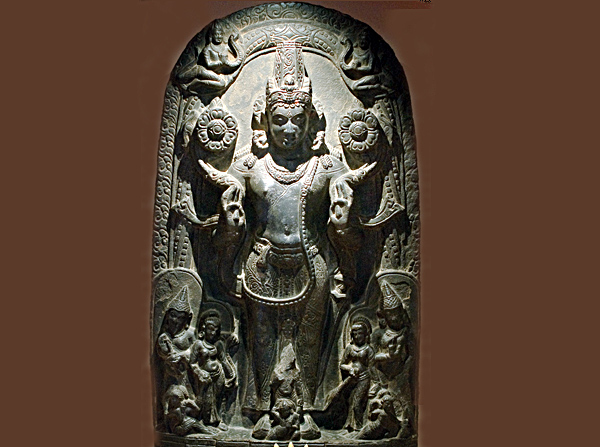 The creator god, the potter named Katya made a clay idol and locked it in a coffer and sent it down to earth. It penetrated several layers and dug itself into the soil where it lay until one day, two workers of the king Dhuri, Sarvan and Narayan stumbled upon it while they were ploughing his field. They brought up the box with great difficulty and the goldsmith, Tatoba, after several attempts managed to break it open. The statue had turned into a little girl and the king and his wife, childless until then, brought her up as their own.
The creator god, the potter named Katya made a clay idol and locked it in a coffer and sent it down to earth. It penetrated several layers and dug itself into the soil where it lay until one day, two workers of the king Dhuri, Sarvan and Narayan stumbled upon it while they were ploughing his field. They brought up the box with great difficulty and the goldsmith, Tatoba, after several attempts managed to break it open. The statue had turned into a little girl and the king and his wife, childless until then, brought her up as their own.
Soon it was time for Suravanti to wed, but that is when all the trouble started. She refused to get married. So, the king, her father, took her to the forest where he built a 7-storeyed tower and left her there. In the forest, one day Suravanti found her way to a cowpen that was extremely dirty. She swept it clean and continued to do so for a few days in a row, until the cow who lived there decided to find out who was behind the good deed.
The cow was a barren one (and presumably that is why not well looked after by her owners), who was extremely pleased with Suravanti when she discovered that the princess was the one cleaning up her pen. The two became lifelong friends.
In the same forest, the princess also befriended a set of baby eagles. One day, in her regular sojourns in the forest, the princess came across a group of tiny eagles who were almost dead with fright. A cobra had them in his clutches and was all ready to eat them up. Upon being saved, the baby eagles too turned into her greatest allies.
Suravanti decided to spend her time in penance. She stood on the thorns of the khair tree (a deciduous thorny tree whose extract is used as an ingredient in paan and gives it the flavour and the red colour) for 12 years and worshipped the sun. Another version to the story says that she worshipped a great god and was blessed by a visit from Sankar who asked her to pray to the sun.
When the sun or Sankar appeared, she asked for a child without a man as a boon and they set her another task. Get the milk of a barren cow, make enough ghee to light 12 lamps and then set them on a tray. The wicks of those lamps had to be made with special cotton, the kind found across the seven seas and meant only for the gods. Once this was done, Suravanti had to take the lamp-lit tray and wave it in front of the sun in a particular order.
The cow and the baby eagles helped Suravanti and once she had managed to do as the gods had asked, she took the tray and waved it as required. At this Sankar disentangled a linga from his matted locks and dropped it into her tray which immediately turned into a liquid. Suravanti drank this up and was soon pregnant.
When the king discovered this, he was livid. He sent many troubles her way, all aimed at killing her and the child in her womb. Suravanti survived them all and finally when her son was born, he emerged from the side of his mother.
This is the god Biroba, worshipped by pastoral communities in Maharashtra (the dhangars), Karnataka (kurubas) and Andhra Pradesh (kurumas). According to several scholars, the worship of Biroba was merged with the worship of Khandoba and over the years, many aspects of the sun have been attributed to Khandoba.
Story collected by: Arundhuti Dasgupta
Text source: King of hunters, warriors and shepherds: Essays on Khandoba by Gunther Dietx Sontheimer, Edited by Anne Feldhaus, Aditya Malik, Heidrun Bruckner; Say to the Sun, “Don’t Rise,” and to the Moon, “Don’t Set”: Two Oral Narratives from the countryside of Maharashtra, Edited and translated by Anne Feldhaus with Ramdas Atkar and Rajaram Zagade
Location: Maharashtra
Image Source: Wikimedia